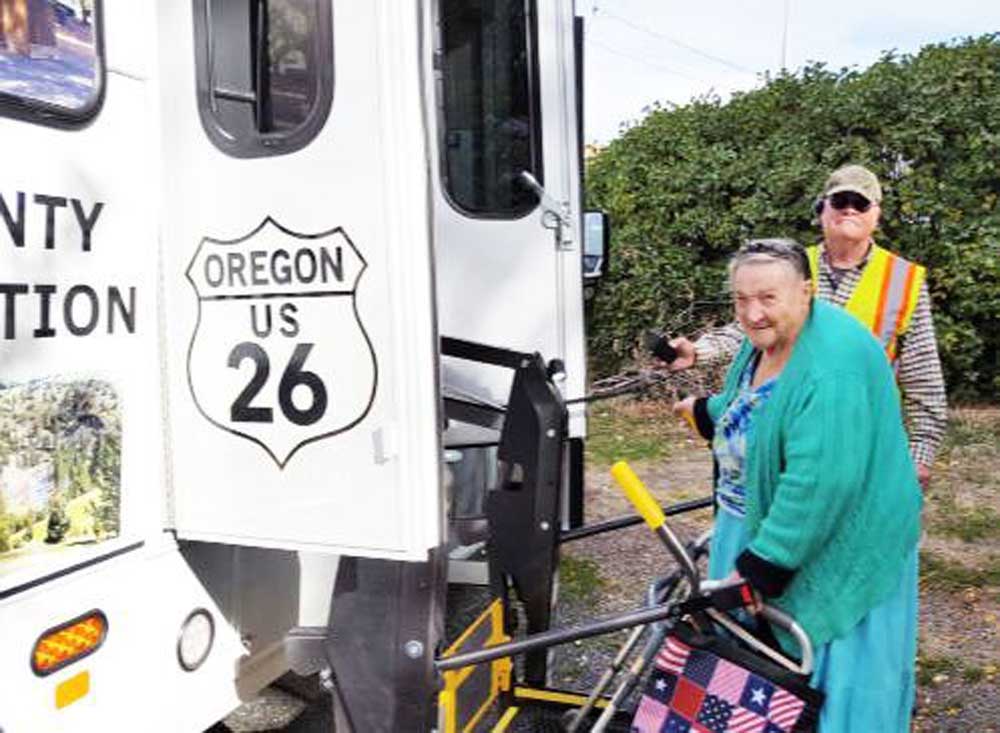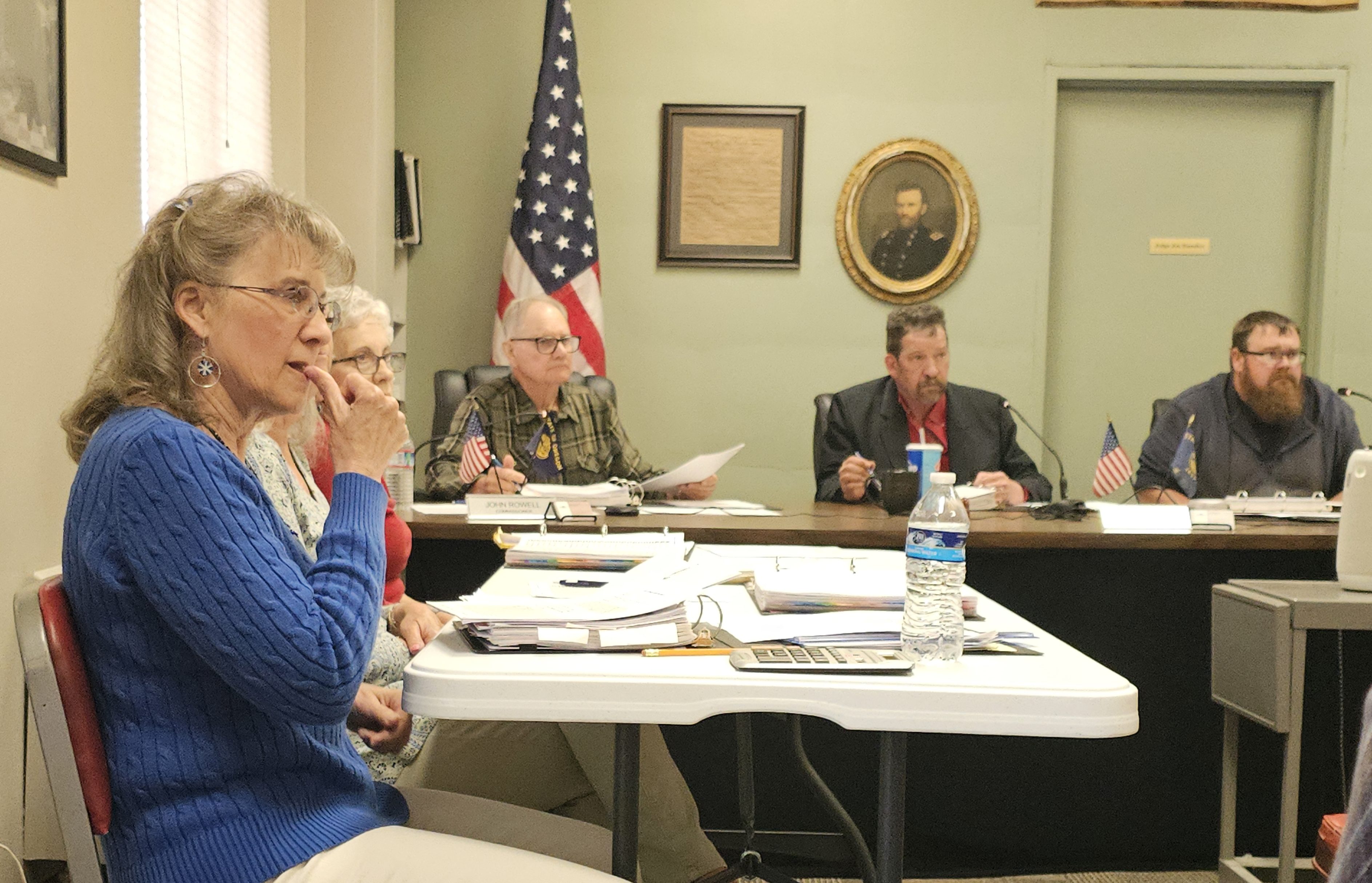Remembering Ruth: Longtime Grant County resident Ruth Harris left an indelible mark on community
Published 6:15 am Wednesday, May 31, 2023

- Ruth Harris, a dedicated rider of the People Mover public transportation service, boards a bus in 2017.
Ruth Harris wasn’t tall, but she wasn’t easily overlooked. And over the course of eight decades in Grant County, she made an outsized impact on the community that far exceeded her small stature.
“She was quite the lady,” reminisced her longtime friend Tammy Bremner, manager of the Grant County Chamber of Commerce. “She had those sparkly eyes.”
Harris also had an energy and sense of purpose that were not to be denied.
“She was an amazing woman … until very recently, she was very sharp,” said Sherry Feiger, another longtime friend. “When Ruth said she was going to do something, she always followed through and she always did a good job.”
Harris died on April 9 at Blue Mountain Hospital in John Day at the age of 95. She is remembered as a pilot, newspaperwoman, radio host, patriot, civic leader and an indispensable figure in many aspects of life in Grant County.
Early life
Ruth Alice Harris was born Oct. 21, 1927, in La Grande to Carl Nathan Barlow and Dorothy Halladay Barlow. She graduated from La Grande High School and attended Eastern Oregon Normal School (now Eastern Oregon University), where she earned a degree in journalism.
She also took classes in aeronautics, which led to a passion for flying.
“She learned how to fly, and she was really good at it,” said her daughter Dorothy Olson, adding that her mother taught flying lessons out of the La Grande Airport.
“She taught all the men how to fly,” Olson added. “This was before women were thought of as teachers. She had to get a special dispensation to wear pants in the airplane.”
There were some close calls.
One time, Olson recalled, the plane Harris was flying shut down in midair.
“Everything died. Nothing was working on the plane.”
Somehow, Harris brought the aircraft in for an emergency landing.
“She landed in a wheat field,” Olson said. “The plane flipped over on its top. The only thing that broke was a little tiny piece of the propeller.”
Newspaper career
Harris held a number of different jobs throughout her life, but according to many who knew her, she had printer’s ink in her veins.
“Newspapers were always her love,” Bremner said.
In fact, it was a newspaper job that brought her to Grant County.
The first paper Harris worked for was in the Portland area (Olson thinks it might have been the Milwaukie Sentinel), but after a short stint there she was reassigned to another paper in the same chain: the Blue Mountain Eagle.
Freshly divorced, Harris arrived in John Day in 1953 to begin her new job as a single mother, with three children under the age of 4 in tow.
She quickly established herself as a jack of all trades at the Eagle. “Mom was the only person who could work every single machine (in the office),” Olson said.
By the late 1960s, though, Harris had managed to get crossways with the new owner of the Eagle and was fired from her job, under circumstances Olson described as “hush-hush.”
And that’s when Harris launched a publication that has carved out a special niche for itself in the history of Grant County journalism: The Juniper Press.
The Juniper Press
The Juniper Press was produced on legal-size paper folded in half, so that each page was about 7 inches square. Each edition — often printed on colored sheets of pale green, yellow, orange or violet — might use four sheets of paper, which made 16 pages printed front and back.
A typical issue might consist of tightly spaced paragraphs packed with information about the selection of the Grant County Fair & Rodeo Court, details of the fair’s 4-H livestock auction, results of the junior rodeo and the prize winners in the annual fair parade. There were also plenty of classified and display ads — many of them hand-written and illustrated by Harris.
Not only did Harris write all the content for The Juniper Press, but she printed the publication herself in a room at her house.
“She had a home duplicating machine — I want to say it was a Gestetner — and she ran it all off,” Feiger said.
Prairie City Pioneer Press
Harris’ newspaper career took another turn with the launch of the Prairie City Pioneer Press in 1975, with her at the helm as editor. A photo on Page One showed a smiling Harris selling the first subscription to local businessman Jerry Franklin.
Franklin, now principal broker at Eastern Oregon Realty in John Day, purchased the fledgling newspaper a few months later and developed a strong working relationship with Harris.
Like most small-town weeklies, the Pioneer Press was a tightly run operation, with Franklin and Harris making up the entire newsroom staff.
“We wrote most everything that was in the paper,” Franklin recalled.
Franklin remembered Harris as a dedicated journalist who would drive clear across the county to get a story and who always accompanied him on his weekly drive to Bend, where the paper was printed.
“On the way there and the way back, we’d have discussions about everything. People always said I spent more time with Ruth than I did with my wife,” Franklin said, though he hastened to add that the relationship was based on friendship, not romance.
Harris penned an occasional column for the Pioneer Press, which she called “Mountains and Molehills.” It was a grab bag of news tidbits, local gossip and flashes of Harris’ sly humor. One installment carried paragraphs about the Prairie City basketball coach, a store window display, the state champion Dayville volleyball team, a macramé display and a surprise party for a member of the Prairie City Commercial Club.
Harris closed the column with this little bit of homespun wisdom: “Remember, you never know what a poor loser you are, until you start to diet!”
Franklin sold the Pioneer Press in the late ‘70s, and it continued to operate for a few more years before the paper — and Harris’ job — came to an end.
But the Juniper Press — which she had never stopped publishing — was still there waiting for her.
The little journal, which Harris appears to have launched about 1970, was still going strong as a stand-alone publication until at least 1999. It began as a five-day-a-week newspaper, with the pace of publication at some point slowing to three days a week. Eventually, according to Olson, it shrank to a single page tucked inside another local weekly, continuing in that form until 2021.
The Juniper Press was distributed around the area for free, with advertising revenue providing a small but steady stream of income for Harris.
“All of us (business people) advertised in it to help her out,” Franklin said.
There were no photographs, but Harris would often include little drawings she’d done herself.
There were also plenty of typos, but nobody seemed to mind.
Memorable mistakes
“Her Juniper Press was notorious,” Feiger said. “She never corrected her mistakes, and some of them were hilarious.”
“She had an ad for Ducks Unlimited that had a typo in it,” Bremner remembered fondly.
Although she was too polite to say exactly what the error was, she added that the whole town got a good laugh out of that particular issue.
“People had copies of that they kept for years,” Bremner said.
Another infamous typo also involved ducks, according to Olson.
“It was (a classified ad) for a drake and three ducks — only the first letter didn’t turn out to be a D,” Olson said.
“Mom didn’t proofread anything,” Olson added. “This woman could type 160 words a minute — she was fast, and she was usually perfect — but every once in a while she would make a mistake that would curl your hair.”
Harris’ own predilection for typographical errors did not keep her from calling them out when she spotted them in other publications.
As a loyal and sharp-eyed reader of the Blue Mountain Eagle, she would frequently call the newspaper to point out the linguistic shortcomings of the latest edition.
The Queen of ‘Coffee Time’
Many people in and around Grant County remember Harris as the longtime host of “Coffee Time” on radio station KJDY in John Day.
She started hosting the program in 1984 and kept right on doing it until around 2010 or so. The half-hour talk show, which aired three to five days a week, started with a peppy female voice singing, “Put down the mop, stand by the broom, find the softest chair in the room — it’s coffee time, coffee time, coffee time, coffee time heeeeeeeere!”
Contrary to popular belief, that wasn’t Harris singing but a recording made at another radio station.
“That came from KUMA in Pendleton,” said Phil Gray, who owned KJDY from 1987 to 2015. “Everybody knew that theme — and I mean everybody!”
Gray recalled Harris as a fixture at the radio station — and in the community.
“She was a character,” he said. “Once you met her, you’d never forget her.”
Harris interviewed a wide variety of people on “Coffee Time,” including such political luminaries as U.S. Sens. Mark Hatfield, Bob Packwood and Ron Wyden and Oregon Govs. Robert Straub, Ted Kulongoski and Neil Goldschmidt.
On one trip through Grant County, Goldschmidt was so busy he couldn’t stop for an interview — so he invited Harris and Todd Keppel, then the editor of the Blue Mountain Eagle, to ask their questions as he rolled down Highway 26 in his RV, Harris told the Eagle for a 2005 article.
More often than not, though, Harris’ guests were local folks — 4-H kids, Extension Service educators, business owners, civic leaders or just friends from the community. And no matter who she might have on the air that day, Harris had a knack for making any interview sound like a friendly kitchen-table chat.
“I’ve been on ‘Coffee Time’ with Ruth many times,” said Dave Traylor, who got to know Harris through their mutual participation in ‘62 Days and other community events.
“We always had an enjoyable banter back and forth,” he added.
“I remember one time I was a little late getting there — not real late, just a little bit — and Ruth was on the radio, saying ‘If anybody sees Dave, tell him he has to get in here — he’s supposed to be on ‘Coffee Time!’
“That’s how we used to do things here in Grant County.”
Community involvement
“Ruth was involved in everything,” remembered Bremner.
“At one time there was a Jaycees Club here, a Lions Club and Kiwanis — I would bet she was a member of all three.”
Harris joined the Chamber of Commerce as the publisher of the Juniper Press and was a lifetime member of the business organization. She loved being involved in the group’s community events and played a leading role in its ceremonies.
“She did almost every installation of officers till COVID,” Bremner recalled. “The only year she didn’t, she was in the hospital.”
She also played a prominent role in the annual ‘62 Days Celebration in Canyon City, lining up talent for the Medicine Wagon Show, acting as mistress of ceremonies and performing as part of the entertainment.
“She loved to play the piano and sing, and she had a hat like Minnie Pearl, with the price tag on it,” Bremner said.
She would often partner with Reed Patterson, a local grocery store owner known for his singing voice and comic patter.
“They had this routine,” Bremner recalled. “She would play the piano, and Reed had a comedy act — they would kind of banter back and forth.”
And she also had a hand in Kam Wah Chung Days, a now-defunct celebration of the area’s Chinese cultural history, donning an Oriental-style dress for the occasion and never failing to join in the fun.
“They had (rickshaw) races, and Scott Myers pushed her in the rickshaw,” Bremner said. “They were undefeated.”
American Legion
Harris was known as a very patriotic woman. She joined the John Day-based Ellis Tracy Unit of the American Legion Auxiliary in 1984 and remained active in the group for the rest of her life, serving a number of terms as president.
“The biggest thing for her was every November at Mosier’s (Furniture) Store, the Legion Auxiliary would have one of their windows … and people were encouraged to bring gifts that could go to the veterans in Portland,” Feiger remembered. “There was times when the window was full. It was very important to Ruth, and it was her project.”
The unwrapped gifts would be on display in the window, where everyone could see them accumulating as the holiday drew near. When the time came, they would be sent to a gift shop at the Portland VA Medical Center, and vets could come choose gifts for their families.
The tradition was interrupted by the COVID-19 pandemic, and now the organizers only want money for gift cards. For Harris, it just wasn’t the same.
“When they decided not to do it anymore, it was hard on her,” Feiger said.
Harris was also involved in the American Legion’s poppy program. During the run-up to Memorial Day, she would set up shop at Chester’s Market in John Day, where she would distribute red paper poppies made by veterans in exchange for donations to support veterans’ services.
“She did everything for the veterans,” Bremner recalled. “At Christmas she would always call up Valley View (Assisted Living) and ask how many veterans they had. She would put together little Christmas bags for all the veterans. … She did that up until last year.”
At one point, Harris managed to combine her passion for music with her American Legion activities.
“She wrote a patriotic song (“United We Stand”) and it was sung at the state convention,” said Joyce Nodine, a fellow member of the Ellis Tracy Unit. “She was so proud of that.”
People Mover
Sometime in the late 1990s or early 2000s, Harris became unable to drive.
“They took her license because she drove too slow,” Bremner said. “And her car, it looked like it was in a demolition derby.”
But losing her license didn’t slow Harris down much. She just switched to another mode of transportation: the People Mover, Grant County’s public transit service.
“Ruth Harris is the People Mover,” said Alesa Molyneux, district manager for the service.
“Over the years I bet she rode the bus thousands of times. She knew all the drivers by name.”
Frank Bingham, who started driving for the People Mover in 2006, said she was a regular rider on his routes from day one.
“She was one of my favorites,” he said. “Up until a few weeks ago, she was riding with us six days a week.”
Harris, who lived next door to the People Mover bus barn in John Day, used the transit service for everything from going to work at the radio station to delivering the Juniper Press to running personal errands such as going to the bank or the post office, Bingham and other drivers said.
“Sometimes she’d ask us to do stuff we couldn’t do” — such as check her mail or do her banking for her — “but you had to love her,” said Sonny Gaytan.
And sometimes she just wanted to ride around, look at the scenery and talk.
“She’d ask if she could ride around for the next pickups, just so she could get out of the house,” Joe Gibson recalled.
“I dropped her off at her house one day. I said, ‘See you tomorrow, Ruth.’ She said, ‘Bye, love you,’ just like I was one of her kids.”
Final arrangements
Harris was predeceased by her first husband, Richard Alvin Tillotson; second husband, Wayne Harris; and daughter Wendy Burke.
Survivors include her daughter Dorothy Olson, sons Robert Tillotson and Mark Tillotson, 13 grandchildren, 35 great-grandchildren and four great-great-grandchildren.
Funeral arrangements are in the care of Driskill Memorial Chapel, John Day. A memorial service will be scheduled at a later date.





